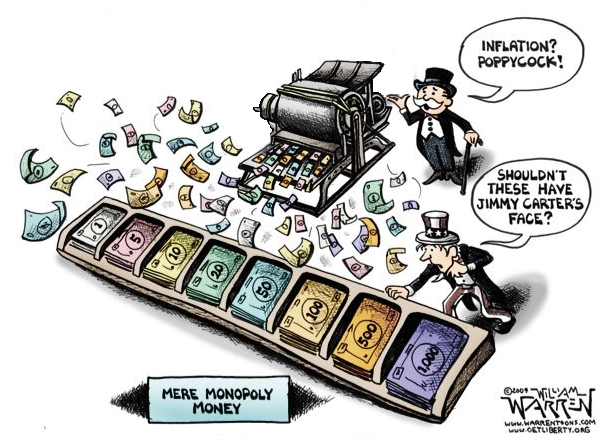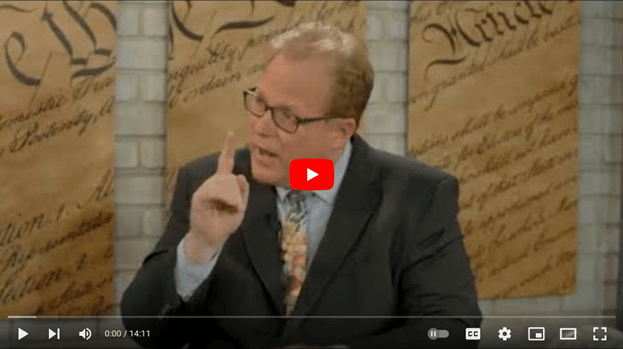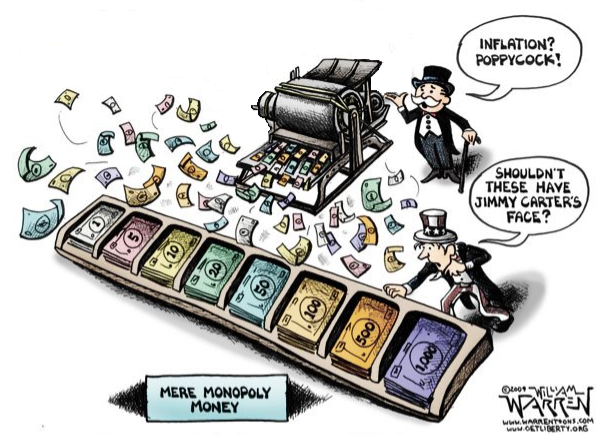Aug. 12, 2022
Permission to republish original opeds and cartoons granted.
U.S. recessions help cool off inflation as Biden touts ‘zero inflation’ for July

By Robert Romano
Consumer inflation cooled a bit in July down to 8.5 percent from its prior high of 9.1 percent, according to the latest data from the Bureau of Labor Statistics as President Joe Biden touted “zero inflation” at an Aug. 10 press conference for the month of July. The annualized rate still rather high, but any softening of inflation — that is, a slowdown in the growth rate of prices on a month-to-month basis — is yet another indicator that the U.S. economy has fallen into a recession.
President Biden has maintained that despite two consecutive quarters of negative growth in the Gross Domestic Product (GDP) reported by the Bureau of Economic Analysis, the economy is not necessarily in a recession. But peak inflation would make a much stronger case.
In recessions dating back through the postwar era, peak annualized inflation always occurs right before or at the moment of the recession, and then softens all the way through the next business cycle, where it bottoms, only to start climbing again towards the next recession.
In Feb. 1954, inflation peaked at 1.5 percent annualized for that recession, and then plummeting to slightly negative by Nov. and Dec. 1954 after the recession.
In April 1957, inflation peaked at 3.7 percent for that recession, and then dropped to 0.13 percent by April 1959 after the recession.
In April 1960, inflation peaked at 1.9 percent for that recession, and then dropped to 0.77 percent after the recession.
In Feb. 1970, inflation peaked at 6.4 percent for that recession, and then dropped to Aug. 1972 to 2.95 percent after the recession.
In Nov. 1974, inflation peaked at 12.2 percent for that recession, and then dropped to 5 percent by Dec. 1976 after the recession.
In April 1980, inflation peaked at 14.6 percent for that recession, and then dropped to 9.7 percent by June 1981 after the recession.
In Aug. 1981, inflation again peaked at 10.8 percent for that recession, and then dropped to 2.45 percent by Aug. 1983 after the recession.
In Oct. 1990, inflation peaked at 6.4 percent for that recession, and then dropped to a low of 1.4 percent in March 1998 after the recession.
In Jan. 2001, inflation peaked at 3.7 percent for that recession, and then dropped to 1.1. percent in Feb. 2002 after the recession.
In July 2008, inflation peaked at 5.5 percent for that recession, and then dropped to -1.95 percent in July 2009.
In Jan. 2020, inflation was at its then-current peak of 2.46 when Covid struck for that recession, and then dropped to 0.24 percent by May 2020 just as labor markets were beginning their recovery.
Now, President Biden appears to be arguing that with prices softening for a single month, that peak inflation has been reached. If so, maybe that means we’re in a recession, Mr. President.
Robert Romano is the Vice President of Public Policy at Americans for Limited Government Foundation.
To view online: https://dailytorch.com/2022/08/u-s-recessions-help-cool-off-inflation-as-biden-touts-zero-inflation-for-july/
Cartoon: In The Way
By A.F. Branco

Click here for a higher level resolution version.
To view online: https://dailytorch.com/2022/08/cartoon-in-the-way/
Video: Manning: 'I'm not surprised they raided the President's residence at Mar-a-Lago.'

To view online: https://www.youtube.com/watch?v=8zTYPTNq86s

Missouri AG Eric Schmitt fights for 2A rights against FBI
Aug. 11, 2022, Fairfax, Va.—Americans for Limited Government Richard Manning today released the following statement responding to Missouri AG Eric Schmitt’s July 13 letter to FBI Director Christopher Wray pledging to fight FBI attempts to illegally obtain private information of concealed carry permit holders in the state:
“Missouri Attorney General Eric Schmitt’s defense of the privacy and individual right to keep and bear arms of the people of the Show Me state is a model for how the top law enforcement officer of a state should respond to unlawful actions by federal law enforcement.
“Upon learning that the FBI intended to come to counties in Missouri to harvest individual concealed carry permit information in direct violation of state law, which explicitly prohibits the sharing of this information with ‘federal, state or private entities’. Schmitt sent a blistering letter to FBI Director Christopher Wray promising to fight him ‘tooth and nail with all the resources the people have given me as their Attorney General.’
“AG Schmitt excoriated the FBI for abuses of power which have cost them the trust of the people citing their targeting of parents of school children who showed up to express concerns to their local school boards, the on-going six-year-long witch-hunt against President Trump and the ‘sitting on evidence of criminal activity on Hunter Biden’s laptop’ as proof of the untrustworthiness of the once respected Agency.’
“Schmitt reminded Wray of the recent U.S. Supreme Court 6-3 decision in the New York Rifle and Pistol Association case which strongly affirmed the individual right to BEAR arms stating that it shall not be infringed. In telling the FBI that the state of Missouri would not stand for the ‘targeting’ of Missouri gun owners, Schmitt drew a line in the sand that every other state Attorney General should follow.
“I often criticize politicians of both political parties for failing to have the courage to stand up in the fight to maintain and restore individual liberty in America. Missouri Attorney General Eric Schmitt is a shining example of what liberty lovers who hold positions of power should do to stand up against federal abuses of power.”
Read the letter from Missouri AG Schmitt to FBI Director Christopher Wray here.
To view online: https://getliberty.org/2022/08/missouri-ag-eric-schmidt-fights-for-2a-rights-against-fbi/

